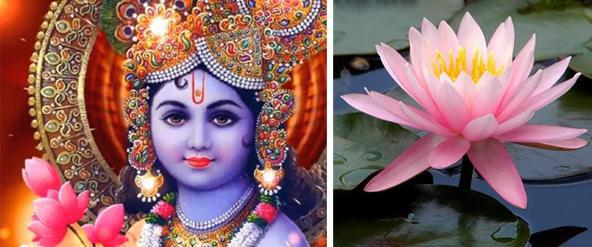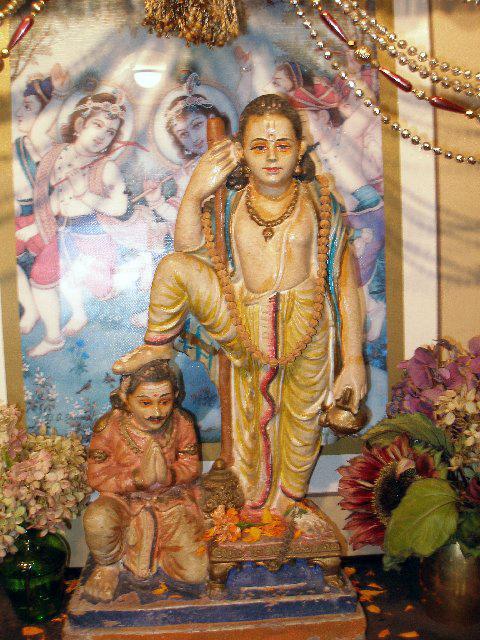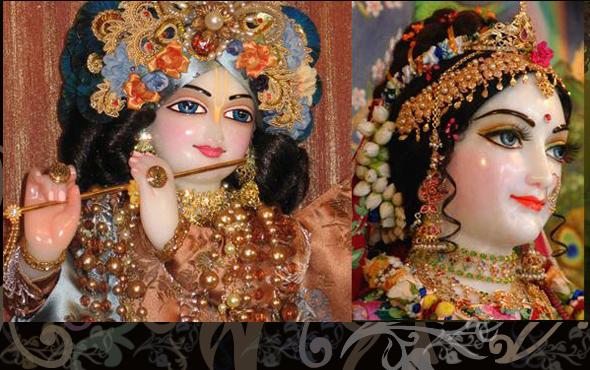 Hare Krishna to All
Hare Krishna to All
Pranams
All glories to Srila Prabhupada and Lord Vamana Dev.
Today is Lord Vamana Dev’s appearance and we as devotees should hear about His lila and some of the philosophical points connnected to it.
Below are a few verses and purports from Srimad Bhagavatam which I think everyone will find very instructive.
Hari bol
Damaghosa das
SB 8.19.21 Lord Vamanadeva Begs Charity from Bali Maharaja
The Personality of Godhead said: O my dear King, even the entirety
of whatever there may be within the three worlds to satisfy one’s
senses cannot satisfy a person whose senses are uncontrolled.

PURPORT
The material world is an illusory energy to deviate the living
entities from the path of self-realization. Anyone who is in this
material world is extremely anxious to get more and more things for
sense gratification. Actually, however, the purpose of life is not
sense gratification but self-realization.
Therefore, those who are too addicted to sense gratification are advised to practice the mystic yoga system, or astanga-yoga system, consisting of yama, niyama, asana, pranayama, pratyahara and so on. In this way, one can control the senses. The purpose of controlling the senses is to stop one’s implication in the cycle of birth and death. As stated by Rsabhadeva:
nunam pramattah kurute vikarma
yad indriya-pritaya aprnoti
na sadhu manye yata atmano ‘yam
asann api klesada asa dehah
“When a person considers sense gratification the aim of life, he
certainly becomes mad after materialistic living and engages in all
kinds of sinful activity. He does not know that due to his past
misdeeds he has already received a body which, although temporary, is
the cause of his misery.
Actually the living entity should not have taken on a material body, but he has been awarded the material body for sense gratification. Therefore I think it not befitting an intelligent man to involve himself again in the activities of sense gratification, by which he perpetually gets material bodies one after another.” (Bhag. 5.5.4)
Thus according to Rsabhadeva the human beings in this material world are just like madmen engaged in activities which they should not perform but which they do perform only for sense gratification. Such activities are not good because in this way one creates another body for his next life, as punishment for his nefarious activities.
And as soon as he gets another material body, he is put into repeated suffering in material existence. Therefore the Vedic culture or brahminical culture teaches one how to be satisfied with possessing the minimum necessities in life.
To teach this highest culture, varnasrama-dharma is recommended.
The aim of the varnasrama divisions–brahmana, ksatriya, vaisya,
sudra, brahmacarya, grhastha, vanaprastha and sannyasa–is to train
one to control the senses and be content with the bare necessities.
Here Lord Vamanadeva, as an ideal brahmacari, refuses Bali Maharaja’s
offer to give Him anything He might want. He says that without
contentment one could not be happy even if he possessed the property
of the entire world or the entire universe.
In human society, therefore, the brahminical culture, ksatriya culture and vaisya culture must be maintained, and people must be taught how to be satisfied with only what they need. In modern civilization there is no such education; everyone tries to possess more and more, and everyone is dissatisfied and unhappy.

The Krishna consciousness movement is therefore establishing various farms, especially in America, to show how to be happy and content with minimum necessities of life and to save time for self-realization, which one can very easily achieve by chanting the maha-mantra–Hare Krishna, Hare Krishna, Krishna Krishna, Hare Hare. Hare Rama, Hare Rama, Rama Rama, Hare Hare.
[formerly the advanced human condition was mode of goodness, where people lived simply and depended upon what material nature would provide for them.Now the modern condition is one of ignorance and passion where our senses are trying to enjoy more and more but becoming less and less satisfied. Our devotee motto is to simplify your life and purify your soul. How to do that? First step is to understand the difference between what we “want” and what we “need”]
SB 8.19.22 Lord Vamanadeva Begs Charity from Bali Maharaja
If I were not satisfied with three paces of land, then surely I would not be satisfied even with possessing one of the seven islands, consisting of nine varsas. Even if I possessed one island, I would hope to get others.
SB 8.19.23 Lord Vamanadeva Begs Charity from Bali Maharaja
We have heard that although powerful kings like Maharaja Prthu and Maharaja Gaya achieved proprietorship over the seven dvipas, they could not achieve satisfaction or find the end of their ambitions.
SB 8.19.24 Lord Vamanadeva Begs Charity from Bali Maharaja
One should be satisfied with whatever he achieves by his previous destiny, for discontent can never bring happiness. A person who is not self-controlled will not be happy even with possessing the three worlds.
PURPORT
If happiness is the ultimate goal of life, one must be satisfied
with the position in which he is placed by providence. This
instruction is also given by Prahlada Maharaja:
sukham aindriyakam daitya
deha-yogena dehinam
sarvatra labhyate daivad
yatha duhkham ayatnatah
“My dear friends born of demoniac families, the happiness perceived
with reference to the sense objects by contact with the body can be
obtained in any form of life, according to one’s past fruitive
activities. Such happiness is automatically obtained without endeavor,
just as we obtain distress.” (Bhag. 7.6.3) This philosophy is perfect
in regard to obtaining happiness.
[here , in a nutshell, above Srila Prabhupada describes material happiness, and next he describes spiritual happiness. Material happiness comes from destiny, past fruitive activity, it cannot be altered, increased or decreased.this type of “happiness” is meant to be understood, tolerated and while this goes on, one should cultivate spiritual happiness thru transcendental senses]
Real happiness is described in Bhagavad-gita (6.21):
sukham atyantikam yat tad
buddhi-grahyam atindriyam
vetti yatra na caivayam
sthitas calati tattvatah
“In the spiritually joyous state, one is situated in boundless
transcendental happiness and enjoys himself through transcendental
senses.
Established thus, one never departs from the truth.” One has to perceive happiness by the supersenses. The supersenses are not the senses of the material elements. Every one of us is a spiritual being (aham brahmasmi), and every one of us is an individual person.
Our senses are now covered by material elements, and because of ignorance we consider the material senses that cover us to be our real senses.
The real senses, however, are within the material covering.
Dehino’smin yatha dehe: within the covering of the material elements
are the spiritual senses.
Sarvopadhi-vinirmuktam tat-paratvena nirmalam: when the spiritual senses are uncovered, by these senses we can be happy. Satisfaction of the spiritual senses is thus described: hrsikena hrsikesa-sevanam bhaktir ucyate. When the senses are engaged in devotional service to Hrsikesa, then the senses are completely satisfied.
Without this superior knowledge of sense gratification, one may try to satisfy his material senses, but happiness will never be possible. One may increase his ambition for sense gratification and even achieve what he desires for the gratification of his senses, but because this is on the material platform, he will never achieve satisfaction and contentment.
According to brahminical culture, one should be content with
whatever he obtains without special endeavor and should cultivate
spiritual consciousness.
Then he will be happy. The purpose of the Krishna consciousness movement is to spread this understanding. People who do not have scientific spiritual knowledge mistakenly think that the members of the Krishna consciousness movement are escapists trying to avoid material activities.
In fact, however, we are engaged in real activities for obtaining the ultimate happiness in life. If one is not trained to satisfy the spiritual senses and continues in material sense gratification, he will never obtain happiness that is eternal and blissful. Srimad-Bhagavatam (5.5.1) therefore recommends:
tapo divyam putraka yena sattvam
suddhyed yasmad brahma-saukhyam tv anantam
One must practice austerity so that his existential position will
be purified and he will achieve unlimited blissful life.
SB 8.19.26 Lord Vamanadeva Begs Charity from Bali Maharaja
A brahmana who is satisfied with whatever is providentially obtained is increasingly enlightened with spiritual power, but the spiritual potency of a dissatisfied brahmana decreases, as fire diminishes in potency when water is sprinkled upon it.







Speak Your Mind